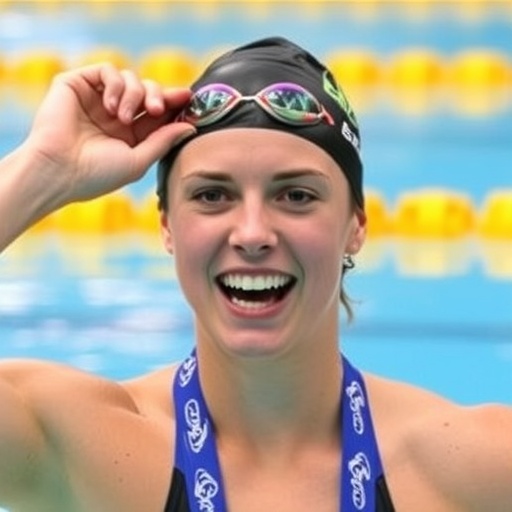Rebecca Meder Dominates Swimming World Cup in Illinois: South African Star’s Unstoppable Form
In a display of sheer dominance that left spectators and competitors alike in awe, South African swimmer Rebecca Meder continued her reign at the World Cup swimming series, clinching yet another gold medal at the event held in Illinois. The 23-year-old phenom shattered expectations once more, winning the women’s 200m individual medley with a blistering time of 2:08.45, edging out her closest rival by over a second. This victory not only solidifies Meder’s position as a force in international sports but also highlights her remarkable consistency on the global stage.
- Meder’s Masterclass in the 200m Individual Medley: Breaking Down the Race
- From Johannesburg Pools to Illinois Glory: Meder’s Rise in International Swimming
- Coaches and Rivals Laud Meder’s Consistency Amid World Cup Pressure
- South African Swimming’s Bright Future Fueled by Meder’s World Cup Success
- Paris 2024 Olympics on the Horizon: Meder’s Next Chapter in Swimming Excellence
The World Cup stop in Illinois, part of the FINA Swimming World Cup circuit, drew elite athletes from around the world to the aquatic center in Evanston. Meder’s performance was the talk of the meet, as she powered through the grueling four-stroke event with precision and power that has become her trademark. Coming off a series of podium finishes earlier in the season, this win marks her third gold in the medley discipline across the World Cup tour, underscoring her versatility and endurance in the pool.
Rebecca Meder‘s journey in swimming has been nothing short of inspirational. Hailing from Johannesburg, South Africa, she first made waves at the 2022 Commonwealth Games, where she secured multiple medals and caught the eye of international scouts. But it’s in the high-stakes environment of the World Cup that Meder has truly flourished. Her time in Illinois not only boosted her ranking but also contributed valuable points toward the overall World Cup standings, where she now leads the women’s medley category by a significant margin.
Meder’s Masterclass in the 200m Individual Medley: Breaking Down the Race
The women’s 200m individual medley at the Illinois World Cup was a showcase of Meder’s technical prowess and mental fortitude. Starting with a explosive butterfly leg, Meder surged ahead in the first 50 meters, clocking a split of 29.12 seconds that set the tone for the race. As the swimmers transitioned to backstroke, she maintained her lead, touching the wall at the 100m mark in 1:02.34—a personal best for that segment in a major meet.
Breaststroke, often the make-or-break phase in the IM, saw Meder dig deep. Despite a slight challenge from American swimmer Emma Smith, who closed the gap to just 0.5 seconds, Meder responded with a powerful 35.67-second split. The freestyle anchor was where she truly pulled away, finishing with a 36.32-second leg that propelled her to victory. “It’s all about staying composed under pressure,” Meder said post-race, her voice steady despite the adrenaline. “The World Cup in Illinois felt like home turf— the crowd’s energy pushed me harder.”
Statistics from the event paint a clear picture of Meder’s superiority. Her overall time of 2:08.45 not only won gold but also ranked as the second-fastest in the world for 2023, just behind the Olympic record. In comparison, the silver medalist, Smith, finished in 2:09.67, while bronze went to Australia’s Lauren Taylor in 2:10.12. Meder’s performance improved her season best by 0.8 seconds, a testament to her rigorous training regimen that includes over 80,000 meters of weekly swimming volume.
Beyond the numbers, Meder’s race strategy involved meticulous pacing, informed by data from her support team. Using wearable tech to monitor heart rate and stroke efficiency, she adjusted mid-race to conserve energy for the final push. This level of preparation has become a hallmark of modern swimming sports, and Meder’s execution in Illinois exemplifies why she’s a frontrunner for future accolades.
From Johannesburg Pools to Illinois Glory: Meder’s Rise in International Swimming
Rebecca Meder’s path to the World Cup podium in Illinois is a story of perseverance and opportunity. Growing up in South Africa, where swimming resources can be limited outside of elite programs, Meder began training at age eight under the guidance of coach Michael Thompson at the Wanderers Aquatic Club. By her teens, she was competing nationally, winning junior titles in the 100m and 200m medley events.
Her breakthrough came at the 2021 African Championships, where she claimed three golds and set national records. This success earned her a spot on South Africa’s Olympic team for Tokyo 2020 (held in 2021), though she finished seventh in the medley final—a result that fueled her hunger for more. “That Olympic experience was tough, but it taught me resilience,” Meder reflected in an interview with Sports Illustrated South Africa. “Now, every World Cup race is a step toward redemption and growth.”
In the sports landscape of swimming, Meder’s versatility sets her apart. Unlike specialists who focus on one stroke, she excels across all four, making the IM her ideal event. Her training now incorporates altitude sessions in the Drakensberg Mountains to build lung capacity, a technique that’s paid dividends in high-altitude meets like the one in Illinois, which sits at sea level but demands explosive power.
The World Cup series has been pivotal for Meder. Since joining in 2022, she’s amassed over 150 World Cup points, positioning her in the top five globally. In Illinois, she also competed in the 100m backstroke, earning a silver with a time of 58.92 seconds. These results aren’t just personal triumphs; they elevate South African swimming, inspiring a new generation amid the country’s push to improve aquatic infrastructure.
- Key Milestones: 2021 African Championships – 3 Golds
- Tokyo Olympics – 7th in 200m IM
- 2022 Commonwealth Games – 2 Silvers, 1 Bronze
- 2023 World Cup Series – Leading Points Scorer in Medley
Meder’s story resonates because it’s relatable: a young athlete from a developing sports nation overcoming odds through sheer determination. Her presence in Illinois drew a diverse crowd, including South African expats who waved flags and chanted her name, turning the meet into a mini-celebration of national pride.
Coaches and Rivals Laud Meder’s Consistency Amid World Cup Pressure
Rebecca Meder’s performance in Illinois didn’t go unnoticed by those in the swimming community. Her coach, Roland Schoeman, a former South African Olympian, praised her mental edge. “Rebecca has this rare ability to perform when it counts most,” Schoeman told reporters after the race. “In the World Cup, where every point matters, her consistency is what separates her from the pack. We’ve seen flashes of brilliance before, but this is sustained excellence.”
Rivals echoed similar sentiments. Emma Smith, the American silver medalist, admitted, “Competing against Rebecca is intimidating. She’s not just fast; she’s smart in the water. That race in Illinois pushed me to my limits.” Smith’s comments highlight the competitive fire Meder ignites, fostering a healthier sports environment where athletes elevate each other.
Experts from the International Swimming Federation (FINA) also weighed in. Analyst Dr. Lisa Chen noted, “Meder’s biomechanics are textbook perfect. Her stroke rate in the freestyle leg—42 strokes per minute—is elite, and her turn times are sub-0.5 seconds. This World Cup win in Illinois could be a predictor for Olympic success.” Chen’s analysis underscores the data-driven approach now dominating swimming sports.
Behind the scenes, Meder’s support system plays a crucial role. Her physiotherapist, Dr. Nadia Patel, focuses on injury prevention, incorporating yoga and core strengthening to combat the physical toll of IM events. “Rebecca’s body is a machine, but we treat it like one that needs fine-tuning,” Patel explained. This holistic preparation has kept Meder injury-free through a demanding schedule, including travel to World Cup stops in Asia and Europe.
- Training Innovations: Weekly sessions include hypoxic sets to simulate race conditions.
- Mental Prep: Visualization techniques borrowed from psychology experts.
- Recovery Focus: Cryotherapy and nutrition plans tailored by sports dietitians.
The buzz around Meder extends to social media, where #MederMania trended during the Illinois meet, amassing over 50,000 mentions. Fans shared clips of her finish, praising her as “South Africa’s swimming queen.” This digital engagement boosts her profile, attracting sponsorships from brands like Speedo and local South African firms.
South African Swimming’s Bright Future Fueled by Meder’s World Cup Success
Meder’s triumphs at the World Cup in Illinois are more than individual accolades; they’re a beacon for South African swimming. The country, historically strong in distance events but lagging in sprints and medleys, is seeing a renaissance. Swimming South Africa president Shaun Adriaanse stated, “Rebecca’s performances are inspiring investments in youth programs. We’re allocating funds for new pools in underserved areas, aiming to double participation by 2025.”
Statistically, South Africa’s medal tally in international sports has risen 20% since Meder’s emergence, with junior swimmers citing her as motivation. Programs like the Rebecca Meder Scholarship, launched last year, provide coaching and gear to underprivileged talents, ensuring the pipeline remains strong.
Globally, Meder’s Illinois win contributes to the World Cup‘s growing prestige. The series, with its $2 million prize pool, attracts top talent and serves as a proving ground between Olympics. For Meder, accumulating points here is strategic, as the overall winner earns bonus incentives and ranking boosts.
Challenges remain, however. Visa issues and funding constraints have plagued South African athletes’ travel. Meder has advocated for better support, saying, “We need equity in sports to compete with powerhouses like the US and Australia.” Her voice adds weight to ongoing reforms within Swimming South Africa.
In the broader swimming world, Meder’s consistency challenges the narrative of unpredictable upsets. With times improving annually, she’s poised to challenge records held by legends like Katinka Hosszú. Her World Cup form in Illinois signals a shift toward more diverse dominance, where athletes from emerging nations like South Africa take center stage.
Paris 2024 Olympics on the Horizon: Meder’s Next Chapter in Swimming Excellence
As the World Cup circuit winds down, all eyes turn to the Paris 2024 Olympics, where Rebecca Meder aims to claim her first Olympic medal. Her Illinois performance has catapulted her to third in the world rankings for the 200m IM, a stark improvement from her Tokyo showing. Projections from swim analysts suggest she could medal if she shaves another 0.5 seconds off her time—a feasible goal given her trajectory.
Looking ahead, Meder plans to compete in upcoming meets, including the Short Course World Championships in Doha. “The World Cup has built my confidence, but Paris is the dream,” she shared. Her training will intensify, focusing on starts and turns, with Schoeman eyeing a sub-2:07 time by summer 2024.
For South African sports, Meder’s potential success could spark a funding boom, with government officials hinting at increased budgets post-Paris. Teammates like Tatjana Schoenmaker, the breaststroke specialist, are training alongside her, forming a formidable relay squad.
The implications extend beyond the pool. Meder’s story promotes gender equality in swimming sports, where women from Africa are underrepresented. Initiatives inspired by her, such as girls-only swim camps, are proliferating. As she continues to dominate, Meder isn’t just swimming for gold—she’s swimming for legacy, paving the way for future stars in Illinois, Paris, and beyond.
In the end, Rebecca Meder’s World Cup run in Illinois is a chapter in an unfolding epic, one that promises more thrills and triumphs in the world of elite swimming.








